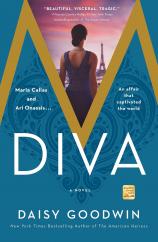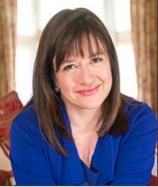Diva
Review
Diva
I never heard Maria Callas sing in person, but I fell in love with her voice --- uniquely dark and thrilling; wonderfully imperfect --- in my early 20s. I bought all her opera albums and saw her in a televised performance of Act II of Puccini’s Tosca: a passionate, glamorous, murderous presence in red velvet and gold, all flashing eyes and high cheekbones.
Don’t worry if you aren’t an opera buff. This novel about the famed Greek-American soprano isn’t big on the musical aspect of her eventful career. Just as British author Daisy Goodwin’s VICTORIA: A Novel of a Young Queen (2016; also a miniseries) sought to locate the woman within the monarch, DIVA emphasizes how Callas’ artistry may have been sabotaged by her desperate need for love.
Goodwin sets up her book as a three-act drama centered around Callas’ very public nine-year affair with Greek shipping magnate Aristotle Onassis, which began in 1959. But within this structure there are plenty of flashbacks --- perhaps too many --- to her earlier life. It’s a cliché to suggest that driven, creative people are overcompensating for an unhappy childhood, but in Callas’ case it seems to be true. Born in New York’s Washington Heights (who knew?!) to immigrant parents whose marriage was already in trouble, and taken to Greece by her mother at age 13 (her father stayed in New York), she grew up in wartime, a hefty, glasses-wearing girl who lost the competition for maternal love with her older sister. Early on, Callas felt exploited by both her mother and her much older husband/manager, Giovanni Battista Meneghini, known as Tita.
"Callas’ personality and talent make a rich subject, and anyone who loves her music and is intrigued by her colorful 'private' life will be drawn in by this book."
Her voice was instantly acclaimed. And then, like a chrysalis, Callas emerged into full stardom: she lost weight, learned how to dress, and hobnobbed with the rich and famous. After crossing paths with the gossip columnist/society maven Elsa Maxwell, she was introduced to Onassis. Goodwin suggests that their bond was based not only on a shared Greek identity but on memories of growing up in hard times. “We have both had to struggle,” Onassis told Callas. Unlike those born wealthy --- his wife, for example --- they were proudly self-made.
At this point, DIVA becomes a “White Lotus”-esque miniseries in book form. The action moves between Onassis’ yacht, the Christina; various luxury hotels and resorts; opera houses and upscale restaurants. Callas’ wardrobe is described in enormous detail. Indeed, a simple computer search yields innumerable paparazzi shots of her, far taller than her husband or Onassis and almost always looking incredibly chic. According to Goodwin, this sense of style did not come naturally; she had a French design team who envisioned her as a goddess (“No frills, no bows, and absolutely no pink”) and told her precisely which accessories to wear with which outfit.
Ultimately, as we all know, Onassis betrayed Callas when he married Jackie Kennedy in 1968, a moment of public humiliation that begins and ends DIVA. But there were so many prior moments of infidelity, insensitivity and plain old lying on his part that it’s difficult to believe that this came as a shock. At one point, Callas even attempted suicide while listening to her own recording of poor, abandoned Cio-Cio-San’s aria “Un bel di” from Madame Butterfly (her performance is a masterpiece of power spliced with fragility).
To my mind, though, what makes Callas a genuinely tragic figure was not her complicated love life but her anxiety about her voice, which, experts seem to agree, began to decline quite early in her career. The novel implies that her frequent cancellations and other prima-donna-ish behavior stemmed not from arrogance but from insecurity. Although the lure of her peripatetic life with Onassis may have been a distraction from work, more likely the problems had to do with the way she used, and abused, her voice in early performances. By the time she became more selective about what and when she sang, it may have been too late.
In her Author’s Note right at the beginning, Goodwin makes it clear that DIVA is a novel, not a biography, and that she has “taken a few liberties” with dates in order to tell a compelling story. I don’t mind that. Callas’ personality and talent make a rich subject, and anyone who loves her music and is intrigued by her colorful “private” life will be drawn in by this book. I was especially interested in the idea that her passionate relationship with Onassis gave her new insights into powerful operatic characters like Norma and Tosca.
However, I was bothered by the way the novel reads. It is chopped into multiple segments labeled for time and place, and further broken up by flashbacks and dialogue-heavy scenes. The effect is stilted and somewhat stagey, especially given cameo appearances by celebrities from Winston Churchill to Marilyn Monroe. There isn’t a continuous narrative voice; it’s more like a slideshow, with captions.
Of course, Callas’ life was nothing if not cinematic; in fact, a movie about her final days, Maria, is said to be opening this year. It stars Angelina Jolie and is directed by Pablo Larrraín, whose other films include the Oscar-nominated Jackie (the irony…) and Spencer, about Princess Diana. He seems to have made a specialty of these lost, beautiful, press-hounded women. The tension between public and private self is common to all three, but Maria Callas was different from Jackie Kennedy or Diana Spencer. She is legendary because of her art, not her association with a famous man.
This is made explicit in DIVA. At a party in Monte Carlo given by Prince Rainier and his wife, the former actress Grace Kelly, Callas observed Onassis flirting with Lee Radziwill, Jackie Kennedy’s sister and wife of a Polish prince. In a side conversation imagined by Goodwin, Princess Grace reminded Callas that “you and I…are women in our own right. I have an Oscar and you are a great singer. But what is that so-called princess? Just a woman with a famous sister who dresses well and who laughs at men’s jokes.” Forbidden by Rainier to return to acting, Grace warned Callas not to stop singing. “Aristo [Onassis] isn’t worth it; no man is.”
It’s too bad that Callas didn’t follow her advice. DIVA doesn’t reach very far into the singer’s post-Onassis life, but the novel certainly foreshadows the dwindling of her career and her premature death, of a heart attack, at age 53. What a loss. What a story.
Reviewed by Katherine B. Weissman on January 26, 2024
Diva
- Publication Date: February 4, 2025
- Genres: Fiction, Historical Fiction
- Paperback: 416 pages
- Publisher: St. Martin's Griffin
- ISBN-10: 125083399X
- ISBN-13: 9781250833990




